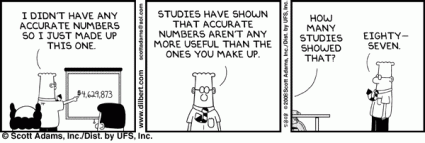All of us focus on the “numbers.” We are driven to “make the numbers,” because those are our goals and we are driven to achieve our goals. When we miss the numbers, we panic, we whip ourselves into a frenzy of activity to do more–all in service of making the numbers. When we achieve our numbers, we “high 5,” start thinking about the President’s club, maybe even the accelerators we might achieve by surpassing the numbers.
The challenge is we become slaves to hitting the number, often forgetting to understand what the numbers mean.
It’s the things we do, how well we do them, who we do them to/with, when we do them and why we do them that produces an outcome, usually measured by a number.
When we miss the number or goal, it’s rare that we take the time to understand the things that created that outcome. We don’t assess whether we are doing the right things as effectively as we could be–or could we improve how we do those things. Or whether we are doing those things with the right people, or at the right time.
We don’t diagnose why we aren’t achieving our goals, what we need to change, or do better.; what we might be doing wrong and need to stop doing.
Or, more importantly, are they even the right things any more? Have things changed? Have our customers changed? Has the competition changed? Is what we thought was effective or impactful no longer so?
Or is there simply a different, more effective way of doing things?
We face the same problem when we make our numbers. While we are pleased for achieving the goal, how often do we consider, “Could we be doing more? Could we be doing better? Are we achieving our full potential?”
I’m working with a marvelous client right now. By virtually every measure, they are doing great! They are growing at double digits, achieving their goals, in many cases overachieving them. They are growing faster than the competition, taking share from them.
But the executive team has challenged them with the question, “Could we/Should we be doing more? Are we missing opportunities with our current customers? Are we missing opportunities to do things differently, achieving more?”
Top performers, whether individuals or organizations, recognize it really isn’t about the numbers. They are important, but they are just an indicator. They don’t tell you what has caused them. They don’t tell you if you can do more or be better.
We have to pay attention to the numbers, they are an “alert” system. When we aren’t making them, something(s) aren’t working as they should or things may have changed. When we are making them, we should challenge ourselves to improve, to set new goals/numbers and figure out what we need to do to achieve them.
It really isn’t about the numbers, it’s all about what we do that causes those outcomes and creates the number.

Leave a Reply